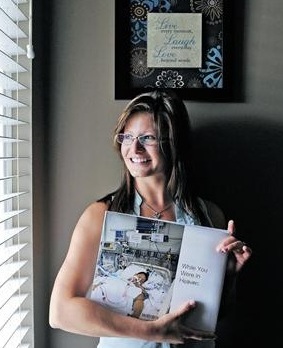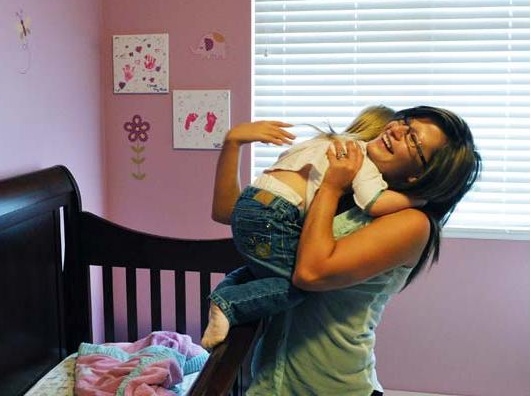

Chelsie Thurlow had been without a heartbeat for about 100 minutes the day she arrived at St. Paul's. Chelsie believes she went to heaven.There was the view of her body being wheeled from Richmond Hospital. There was a vision of her body on an operating table surrounded by surgeons, and the sound of surgical instruments being laid on a tray. And there was another place, lovely and warm, from which her mother called her back. “I do believe I went to heaven.” |
 |
 |
July 22, 2012 - Reported in [theprovince.com]. The deadly virus could have come from virtually anywhere: her husband's kiss, a shopping cart's handle, the cough of a stranger. Slowly, it took hold in Chelsie Thurlow's body, multiplying, spreading, slipping into her cells. For two weeks, Thurlow, now 24, had suffered flulike symptoms. The animal-care assistant at a veterinary hospital had a fever, severe body aches, a sore throat. Then her voice rose in pitch, leading Thurlow's mother to tell her over the phone, "You sound really awful." Still, as a new mother, Thurlow was immersed in caring for her daughter Chloe, just four months old. On Oct. 21, 2010, Thurlow put Chloe in a swing at their Richmond home. Her husband, Stephan Bouchard, a renovations contractor, was at work. Feeling so weak she could barely move, Thurlow thought she ought to eat, but when she opened the cupboard to grab peanut butter to spread on toast, the sight of the jar made her want to vomit. A fit woman who ate healthy food, Thurlow knew it was time to get medical help. She had no idea that her particular physical makeup made her especially vulnerable to a notuncommon condition called viral myocarditis. Caused by any of a hundred viruses, the disease can have unnoticeable effects in many people. Thurlow's immune system sent virus-attacking white blood cells into her heart. But the enzymes released by her white cells to destroy invading pathogens were causing heavy collateral damage to the organ that pumps her blood. Her doctor's office said she couldn't be seen until evening. Within an hour, Thurlow was too weak to lift her daughter. She called her husband. He asked if he should call for an ambulance. She asked him to come home and drive her to hospital. "I thought maybe she was a little bit tired with taking care of the baby," Bouchard says. He wrapped up his day's job and was home 40 minutes later. On the way to Richmond Hospital with Bouchard, and Chloe in a car seat, Thurlow noticed a tightness in her chest. She has asthma, so didn't pay much attention to the new sensation. The feeling, however, was a symptom of myocarditis: her heart was inflamed, and enlarging. Ultimately, it would swell to half again its normal size. At the emergency department's triage desk, Thurlow explained that she was a new mom, and she just needed treatment so she could return home and care for her baby daughter. Doctors decided to take an ultrasound of her chest. Bouchard told a doctor he wanted to go home and eat, then come back when Chelsie had been treated. "The doctor says, 'You might want to stick around, because we don't know,'" Bouchard remembers. Bouchard instead took Chloe up to the hospital cafeteria. Twenty minutes later, he heard the intercom broadcast a "Code Blue" in "diagnostic imaging." On a previous hospital visit, Bouchard had asked a nurse what the various colour codes meant. "I know Code Blue is 'cardiac arrest,' and 'diagnostic imaging' sounds like ultrasound," he says. But his wife was just sick with a cold, or the flu, or asthma, he thought, so the Code Blue must be for someone else. A minute later his name came over the intercom, calling him to emergency. A doctor, nurse and social worker were waiting for him. "There have been some complications with Chelsie," the doctor told him. "She's in cardiac arrest. We've been trying to revive her for 20 minutes, but we have not been successful." The doctor said Thurlow's only hope was surgery at St. Paul's Hospital in Vancouver, but she estimated Thurlow's chance of survival at 10 per cent. "The world froze," Bouchard says. "Twenty minutes ago, I'd just kissed my wife, who was nowhere near dying in my head." He asked to see his wife. A hulking doctor was above her, attempting cardiopulmonary resuscitation. "It was not a pretty sight," Bouchard says. "She had blood coming out of her mouth. Her eyes were kind of rolled back. Bouchard pleaded with the doctors: "Please take her away now. Hurry up - save her!" Thurlow's heart had stopped while doctors were watching it live via the ultrasound machine. A doctor had immediately started CPR. The chest compressions went on for 35 minutes, to no avail. Typically, doctors, nurses and paramedics give up on a patient after 10 to 40 minutes of CPR. Attempts to jump-start her heart with a defibrillator failed. Thurlow was, effectively, dead. But she was young and healthy, and doctors kept up the CPR on the off-chance she could be saved. Meanwhile, Richmond Hospital had contacted Dr. Anson Cheung, a pioneering cardiac surgeon at St. Paul's Hospital in Vancouver. By the time Cheung received the call, Thurlow had been receiving CPR for 35 minutes. "I thought it was a desperate and difficult situation, and it was unlikely they would have any success at that point if there was no further mechanical support," Cheung says. The "mechanical support" was a ventricular- assistance device (VAD), an implanted heart pump. And the work of St. Paul's cardiac staff is so highly regarded world-wide that the hospital is often the first chosen for trials of new versions of such devices. If Thurlow's heart could be kept pumping through CPR, she might be brought back to life by surgical implantation of a heart pump. But even then, there was a strong likelihood her brain had been so deprived of oxygen that she would have suffered severe brain damage. Thurlow was put in an ambulance for St. Paul's. CPR continued throughout the ride. By the time she reached the hospital, she'd been undergoing CPR for more than 100 minutes. She was wheeled straight into the operating room. Thurlow was dead, and watching from above, she says, as her body was wheeled out of Richmond Hospital to a waiting ambulance. She saw police cars - a shooting victim had just been brought in. She saw her husband behind glass doors - the hospital was in lockdown while responding to the gunshot victim. "My interpretation is I was gone, or going," says Thurlow, recalling her above-the-scene recollection. She was still dead when she arrived at St. Paul's Hospital in Vancouver, in spite of more than 100 minutes of CPR. To try to save her, doctors hooked Thurlow up to a machine that would temporarily take over her heart and lung function, pumping blood out of the femoral vein in her groin, oxygenating it, and pumping it back into her femoral artery. Doctors told Bouchard they would have to wait until the next day to determine Thurlow had suffered any brain damage. "If she sustained brain damage, it's game over," Bouchard recalls doctors telling him. "They'd let me say my good-byes, and then pull the plug." Thurlow's parents arrived from Calgary. The family gathered in a waiting room, terrified and tearful. The morning brought the first inkling that Thurlow's outcome might not be as tragic as they'd feared. She was able to blink on command, and wiggle her toes. Doctors told the family she wouldn't be a vegetable, but probably would have mental deficits. Meanwhile, the heart-and-lung machine could only be used temporarily before causing irreparable damage. Doctors asked the family to approve installation of a heart pump. They agreed. Dr. Jamil Bashir slit open Thur-low's chest, sawed through her sternum and spread apart her rib cage to install a HeartMate 2 pump. The bracket-shaped titanium-and-Gore-Tex device, which costs $85,000, took about four hours to implant. Connected to an external battery pack, it sucks blood out of the heart and pumps it into the aorta, which sends it through-out the body. Thurlow wouldn't, it appeared, die of heart failure. But her brain was a different mat-ter. CPR is no substitute for the beating heart that pushes oxygen-laden blood through the brain. "After 100 minutes of CPR, we were gravely concerned that she's going to have major neurological damage," says Dr. Andy Ignaszewski, head of cardiology at St. Paul's. Eleven days later, doctors took Thurlow out of her medically induced coma. Her family, who had been taking shifts sitting beside her, anxiously awaited her response to re-awakening. "The first person she saw was her mom," Bouchard says. Thurlow asked where Chloe and her husband were. She thought she must have been in a car accident. Her reasoning, though wrong, was an indication that her brain was functioning in what appeared to be a normal manner, Bouchard says. "We were very enthusiastic at that point," he adds. The veteran cardiologist Ignaszewski was "amazed" at Thurlow's level of response. Thurlow remembers waking up and seeing her mother. But she has other memories, recollections from when she was unconscious.There was the view of her body being wheeled from Richmond Hospital. There was a vision of her body on an operating table surrounded by surgeons, and the sound of surgical instruments being laid on a tray. And there was another place, lovely and warm, from which her mother called her back. "I do believe I went to heaven," Thurlow says. "I was in this place. It reminds me of some exotic resort. It was hot, and I could see nothing but beach and ocean and these beautiful trees. I wasn't scared. I didn't really see anyone else around me other than a family in the distance walking toward the sun on a dock. "Through all this I could hear my mom talking to me. I could hear her say things like, 'Chelsie, you need to come back to us. I'm here for you.' I heard her voice the whole time. "When I woke up and repeated it, she said she actually did say all of those things." A few months after the heart pump was installed, Dr. Cheung used his pioneering method to extract it without opening up her chest again. He removed the device through a small cut in her side, between two ribs. She was home within four days. Now Thurlow is fully recovered. Living in Surrey with Chloe and her husband, she's healthy and her mind is sharp. "It is nothing short of a miracle that A, she survived this disease, and B, she got her brain back," Ignaszewski says. Thurlow continues taking heart medication, but has had no further trouble. Still, she says, she sometimes falls prey to fears of sudden death. "I live each day to the fullest," she says. "Sometimes it's a sunset or a view of the mountains, and I'll just start crying. All those things you take for granted every day, I don't any more." She remains grateful to the team who saved her life, including the cardiologist who told her family he'd cried over her case, a first for him in 18 years of practice. "There's a little girl upstairs right now who has a mom, and at four and a half months, she shouldn't have," Thurlow says. And there's a man who, against tremendous odds, still has his wife. "I had a strong belief in my heart that she would stay with us," Bouchard says. "I very, very easily could have been wrong. We were fortunate to have one of the elite teams in the world as far as heart problems. Nobody gave up on her. "For that alone I'll be thankful to those people for the rest of my life." [Watch/view] video of Chelsie hurlow talk about her suffering a cardiac arrest. |